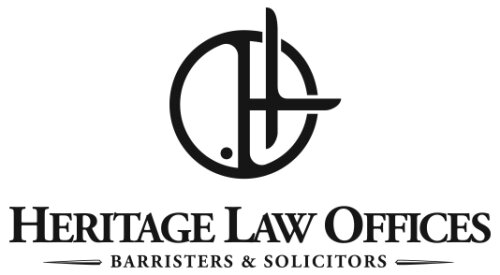Best Discrimination Lawyers in Canada
Share your needs with us, get contacted by law firms.
Free. Takes 2 min.
Or refine your search by selecting a city:
List of the best lawyers in Canada
About Discrimination Law in Canada
Discrimination law in Canada is designed to protect individuals from unfair treatment based on certain protected characteristics. These include race, national or ethnic origin, colour, religion, age, sex, sexual orientation, gender identity or expression, marital status, family status, disability, and pardoned criminal convictions. The Canadian Human Rights Act and the Charter of Rights and Freedoms are the primary legal frameworks addressing discrimination. These laws ensure equal opportunity and protection for all individuals, particularly in the contexts of employment, housing, and services available to the public.
Why You May Need a Lawyer
There are several situations where individuals may need legal advice regarding discrimination:
- You believe you have been denied a job or promotion due to discrimination.
- You are experiencing harassment in the workplace related to any protected characteristic.
- You face discrimination in accessing housing or public services.
- You require assistance understanding your rights under Canadian discrimination laws.
- You wish to file a complaint against an employer or organization but are unsure where to start.
Local Laws Overview
Discrimination laws vary slightly from province to province, but all follow the national framework established by the Canadian Human Rights Act. Each province has its own human rights commission or tribunal which handles discrimination complaints. Employment discrimination is governed by both federal and provincial laws, depending on the sector. Federally regulated industries are subject to federal discrimination laws, while other industries follow provincial regulations. It is important to understand which jurisdiction applies to a specific situation.
Frequently Asked Questions
What constitutes discrimination in Canada?
Discrimination occurs when an individual is treated unfairly or differently based on protected characteristics such as race, gender, religion, or disability.
How do I prove a discrimination claim?
To prove discrimination, you must show that you were treated differently due to a protected characteristic and that this treatment was not based on legitimate reasons.
Can I be fired for filing a discrimination claim?
No, retaliation against someone for filing a discrimination claim is illegal in Canada. Employers cannot dismiss or punish employees for asserting their rights.
How long do I have to file a discrimination complaint?
The time limit varies by province but is generally within one year of the discriminatory act. It is crucial to file as soon as possible to ensure your rights are protected.
Do I need a lawyer to file a discrimination complaint?
While you do not need a lawyer to file a complaint, having legal assistance can help navigate complex procedures and strengthen your case.
What is the role of a human rights commission?
Human rights commissions investigate claims of discrimination, facilitate mediation between parties, and seek to resolve issues outside of court when possible.
Can I bring discrimination claims related to past events?
Yes, but the general rule is that claims should be made within a specific time frame, usually one year from when the incident occurred.
What kind of remedies are available for discrimination claims?
Remedies may include financial compensation, reinstatement, policy changes in the offending organization, and other corrective actions.
How are disability-related discrimination claims handled?
Disability discrimination claims often involve issues of reasonable accommodation. Employers must accommodate an employee's disability to the point of undue hardship.
What should I do if I witness discrimination?
If you witness discrimination, document the incident and support the affected individual. You can encourage them to report it and offer to provide a statement if necessary.
Additional Resources
Here are some helpful resources for those seeking legal advice on discrimination in Canada:
- Canadian Human Rights Commission
- Provincial Human Rights Commissions (e.g., Ontario Human Rights Commission, British Columbia Human Rights Tribunal)
- Legal Aid organizations in each province
- Community Legal Clinics
- National and local non-profit organizations addressing specific discrimination issues (e.g., disability rights groups, LGBTQ+ advocacy organizations)
Next Steps
If you need legal assistance regarding discrimination issues, consider the following steps:
- Document every instance of discrimination, including dates, times, and details of the incidents.
- Contact your local human rights commission for guidance on filing a complaint.
- Consult with a lawyer specializing in discrimination law for advice tailored to your situation.
- Explore mediation services which could offer a resolution without the need for lengthy legal proceedings.
- Evaluate your legal options and proceed with filing a formal complaint if necessary.
Lawzana helps you find the best lawyers and law firms in Canada through a curated and pre-screened list of qualified legal professionals. Our platform offers rankings and detailed profiles of attorneys and law firms, allowing you to compare based on practice areas, including Discrimination, experience, and client feedback.
Each profile includes a description of the firm's areas of practice, client reviews, team members and partners, year of establishment, spoken languages, office locations, contact information, social media presence, and any published articles or resources. Most firms on our platform speak English and are experienced in both local and international legal matters.
Get a quote from top-rated law firms in Canada — quickly, securely, and without unnecessary hassle.
Disclaimer:
The information provided on this page is for general informational purposes only and does not constitute legal advice. While we strive to ensure the accuracy and relevance of the content, legal information may change over time, and interpretations of the law can vary. You should always consult with a qualified legal professional for advice specific to your situation.
We disclaim all liability for actions taken or not taken based on the content of this page. If you believe any information is incorrect or outdated, please contact us, and we will review and update it where appropriate.
Browse discrimination law firms by city in Canada
Refine your search by selecting a city.















